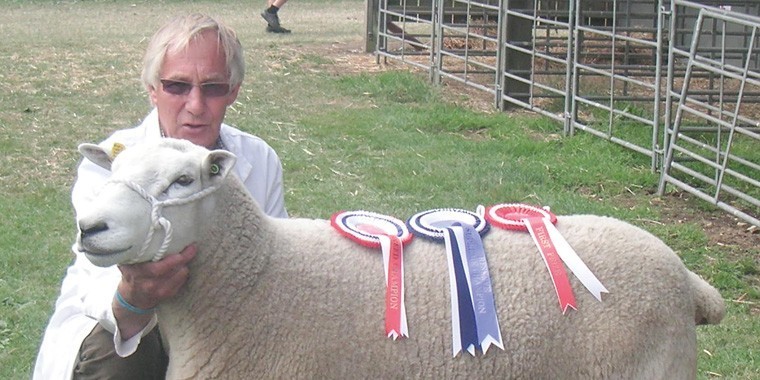It is good to see a bit of confidence in the sheep sector: finished lamb prices have fallen back over the past few months, but we are now just about were we were at this time last year, giving a reasonable return to those that are doing the job right.
With the English national flock on the way up again, reaching a 12 year peak at some three per cent above last year’s figures, the ewe trade has reflected the confidence in the sheep sector with sensible prices, after a bit of a shaky start.
Ram prices do seem however to have been rather up and down, but that is often the way because when ewe prices are good, breeders seem to want to buy their rams cheaply. To me this seems rather counter intuitive: surely, when ewe prices are high, good rams are even more important to ensure a better return on your investment. After all, there are good rams and there are cheap rams – but there are no such things as good cheap rams.
If a good ram adds only an extra 0.25 kilograms (deadweight) to every lamb he sires, he will – if put to 50 ewes in a flock lambing at 150% – add an extra £75.00 (@ £4.00 per kg, deadweight) in income for each year he is working, or an extra £300 over a four year working life, significantly more than some people expect to pay for a ram. The store lamb trade has also been quite encouraging, particularly for the stronger lambs with buyers obviously expecting a sensible return going into next year and helped by the fact that many producers have more grass in front of their sheep now than they have had all season.
The abundance of fresh grass has certainly come at the right time to move ewes on a bit in preparation for tupping. I am having to hold ewes back a bit so they don’t get overdone. I have not flushed ewes for a long time in order to keep lambing percentages down to around 200%: I really do not want lots of triplets and certainly not quads.
I am currently (when I have time) reading “Sapiens: A Brief History of Mankind” by Yuval Noah Harari, a thoroughly interesting and thought provoking read. It is a book that deals with the development of human society since modern man (Homo sapiens) evolved, including the contribution that agriculture has made to the advancement of society and cultures.
Some of his views, well argued and reasoned, on the wider, consequential impacts that the discovery and development of agriculture have had on human society, do raise some challenging and uncomfortable questions that certainly make one stop and think. The author considers the varying rates of progress made different countries, cultures and empires around the world, particularly from the sixteenth century onwards attributing much of the progress made to “recognising ignorance.” He argues that many countries etc that grew and prospered initially either stagnated or began to fall into decay as they became complacent and came to think that their view of the world and all that went with it was the only view and so became egocentric and inward looking; whereas those that recognised ignorance – i.e. realised and accepted that they did not know everything and went out to explore the wider world and expand their collective knowledge – continued their advancement. This led me to consider just how prepared we are to recognise ignorance in modern UK (Western) society, including in agriculture. Sadly I came to the conclusion that there are many in the industry, including the sheep sector, that have lost the ability to recognise ignorance, largely as a result of having, for some time now, had a relatively comfortable life (OK there have been ups and downs, particularly since joining the European Union.)
We have been and still are a largely successful and efficient industry, the sheep sector as much as any other part of the industry and significantly better than some. But we have for too long benefitted from the buffering effect of farm subsidies, and many of the regulations that go with them which have, in many cases, removed the pressure and incentive to innovate and to recognise ignorance.
Agriculture and those engaged in it do tend to be rather conservative (with a small c). It is a long term industry that requires a degree of stability, but that should not be an excuse for a lack innovation and progress. One thing I really dread hearing from a student is “this is not how we do things at home” – a sure indication of a closed mind. But it is an attitude that is, sadly, not uncommon in the whole sector.
Sadly we also have a government (and many previous governments) that seems to have lost the ability to recognise ignorance, a government (some of whom seem quite happy to sacrifice agriculture at the alter of trade agreements) that is currently negotiating our exit from the EU with seemingly closed minds. As an industry we do desperately need to rediscover and develop our ability to recognise ignorance if we are going to survive.




